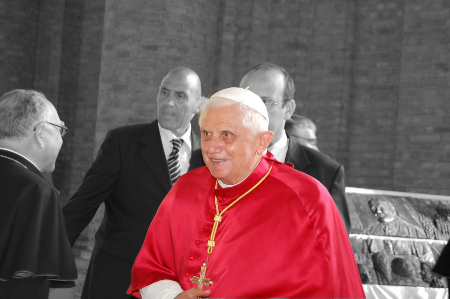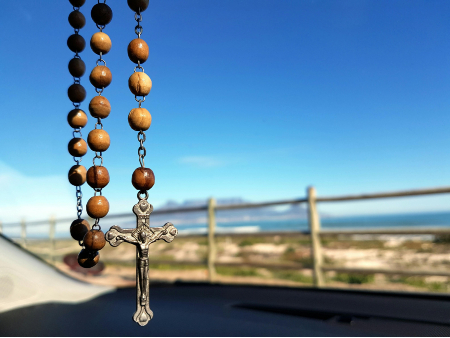Andrew M. Greenwell: St. Bonaventure on Piety, a Gift of the Holy Spirit
FREE Catholic Classes
Those who are docile to the gift of piety--to God, to self, to neighbor--will exhibit certain characteristics. By their fruits, you shall know the pious. St. Bonaventure calls these the results of piety. Without piety, revelation is closed to us. Scriptures will not yield their treasure. Our minds become spiritually obtuse. The truths taught by the Church will not resonate. Reason become blind.
We ask you, humbly: don't scroll away.
Hi readers, it seems you use Catholic Online a lot; that's great! It's a little awkward to ask, but we need your help. If you have already donated, we sincerely thank you. We're not salespeople, but we depend on donations averaging $14.76 and fewer than 1% of readers give. If you donate just $5.00, the price of your coffee, Catholic Online School could keep thriving. Thank you.Help Now >
Highlights
Catholic Online (https://www.catholic.org)
2/5/2015 (9 years ago)
Published in Living Faith
Keywords: Andrew M. Greenwell, Piety, prayer, Holy Spirit, St. Bonaventure, charisms, virtues, infused virtues, habitual grace, sanctifying grace,
CORPUS CHRISTI, TX (Catholic Online) - In this second of a series of articles on St. Bonaventure's teachings on the seven gifts of the Holy Spirit, we shall address the next gift on his list.
As we discussed in the last installment, in his spiritual conferences on the gifts of the Holy Spirit, St. Bonaventure worked up backwards from the list of the seven gifts in Isaiah 11:1-3, starting with the gift of the "fear of the Lord."
The second of the "seven holy things" (sacrum septenarium) is piety, or--in Latin--pietas. (Is. 11:2) It is part of our duty as Christians to be docile to this gift, to accede to it, to allow it to overcome us. "Exercise your very self in piety," St. Paul tells his disciple and fellow bishop St. Timothy (1 Tim. 4:7).
Unfortunately, the English word piety does not fully convey the rich meaning of the Latin term pietas.
To understand the meaning of piety in the context of the gifts of the Holy Spirit, we would do well to adopt St. Bonaventure's tripartite analysis. "There are three things for us to consider" regarding piety, St. Bonaventure notes in his conferences dealing on the subject, "the exercise of piety, the result of the effort of piety, and the original principle of piety."
The Exercise of Piety. The exercise of piety differs depending on its object. There are three objects upon which the gift of piety may be exercised: God, self, and neighbor. Depending upon the object, piety has a certain aspect. St. Bonaventure defines these as follows.
With respect to God, piety shows itself in "reverence of divine veneration." With respect to self, piety displays itself in "custody of intrinsic sanctification." When one's neighbor is the object of piety, we ought to see the "overflowing of internal pity [miserationis]."
Reverence of Divine Veneration. Succinctly, the piety shown to God is the cultus Dei, the worship or adoration that is due God. [III, 5]
St. Bonaventure distills the requirements of the cultus Dei, the adequate worship or adoration of God, into his three-fold phrase: "reverence of divine veneration." The word "reverence" refers to our internal or subjective attitude.
The word "divine" refers to the object of our reverence, namely, God. And the word "veneration" refers to the means, i.e., the ritual, forms, rites, etc. we use in our effort to express our subject reverence of God Almighty.
All three of these aspects--the objective, the subjective, and the means--must be sound for true piety to exist. One might say pietas ex integra causa, piety requires an integrity of all three of its aspects. If any one of these aspects is missing it means that our piety has spoiled or is a false piety. Thus subjectively piety is spoiled by our distraction, or our failure to recollect ourselves, or by our hypocrisy. Objectively, our piety is spoiled if we direct it to an object other than God: an idol of any kind. The means can ruin our piety if we recruit or adopt foreign or novel rites or practices--say pagan rituals, superstition, or superficial or banal modern means--in the worship of God.
Custody of Intrinsic Sanctification. Though it may seem strange to our modern ears, we also owe the gift of piety to ourselves. Piety to ourselves is--in the words of St. Bonaventure--the "custody of intrinsic sanctification."
The word "custody" points to the duty that arises out of the piety toward self: we take care of our souls as a farmer does his fields. The word "intrinsic" refers to the location of the object to our piety: something within us. We are dealing with the interior life of the soul. The word "sanctification" identifies the object within us to which piety's duty attaches itself.
This sacred duty of piety toward our self is one which seeks to preserve God's great gift of sanctifying grace. In the words of Pere Jean Nicolas Grou (Maxim IV) the piety towards one's self involves the "faithful preservation of sanctifying grace and of God's favor," which "is the primary duty of every Christian."
This is exactly St. Bonaventure's meaning. In the words of St. Bonaventure: "'Have mercy on your soul!' That is, have piety for your soul . . . . And in what manner? 'Gather and contain your heart in holiness.'" [III, 7 (quoting Eccl. 30:24)]
Overflowing of Internal Piety. The last object of piety is our neighbor. Here, piety exhibits itself as the overflowing of internal piety." This is defined as an internal, habitual tendency to show miseratio toward our neighbor, that is, to show pity, compassion, sympathy, empathy, commiseration, or a sense of mercy toward our neighbor.
What St. Bonaventure has in mind is typified in the acts of some of the Old Testament patriarchs.
In showing piety to our neighbor, we should show the miseratio of David who refrained from killing his mortal enemy King Saul when he had the opportunity in the hopes of reconciling with him.
We should exhibit the miseratio of Moses, who offered his very life to God in exchange for God's forgiveness of the stiff-necked Hebrews.
We should display the miseratio of Joseph, who fed his brothers with the grain of Egypt which was under his control although these very brothers had sold him heartlessly into slavery.
We should imitate the miseratio of Noah, who built the ark to save mankind, though he suffered the indignities of their ridicule.
We should follow the miseratio of Abraham, who interceded for the city of Sodom, asking God whether he would spare the city if he should find even a few righteous men.
The Original Principle of Piety. Although the Old Testament patriarchs are exemplars of piety, the original principle of piety is transcendent. It is found in the uncreated Trinity and communicated to us by the Incarnate Word, and thereby made immanent. And from God to Christ it flows into Christ's body, the Church.
According to St. Bonaventure, piety--especially in its form of miseratio or merciful compassion--is an attribute of God. As God's image, man ought to participate in it. Audi! Es imago Dei . . . igitur . . . debes configurare Deo in pietate! "Listen! You are an image of God . . . therefore . . . you ought to configure yourself to God in piety!" [III, 11]
Being both God and man, Jesus is the divine piety incarnate, humanified, crucified. The very kenosis or inanition of God in Christ who, in the words of St. Paul, "being in the form of God . . . emptied himself, taking the form of a servant, being made in the likeness of men, and in habit found as a man" (Phil 2:6-7), is the very fullness of piety. "I say," exclaims St. Bonaventure, "that the Incarnate Son of God assumed our indigence. What did this? Piety certainly." [III, 12]
"Through piety, [Christ] assumed flesh, ascended the Cross, came back to life from the dead, sent the Holy Spirit upon the earth, called the Church to Himself and through piety freed everything fitting from misery." [III, 12] Piety is therefore akin to love, the love that is reflected in the mysteries of our Creed.
Piety is at the heart of the Gospel narrative, of the Christian Creed. The Credo is a narrative of God's piety. Credo in unum Deum is the start of piety. Piety's end is vitam aeternam. Piety encompasses the whole creed.
At the heart of the Gospel and the Creed both is a person: Jesus. Jesus is the centerpiece of piety; one might even say that Jesus is piety made flesh. "The mystery of human redemption," St. Bonaventure says, which is "accomplished through the Incarnate and Crucified Word," "is a great sacrament of piety." [III, 12]
It follows that if Jesus Crucified is a "great sacrament"--or great visible sign of the internal piety of the Blessed Trinity--then the Mass which is the one and the same sacrifice of Christ made present on our altars is also the "sacrament of piety." The Mass is given to us, says St. Bonaventure, "so that mindful of the sacrament of piety, we might put on the internals of piety." [III, 12]
In Communion, we ingest the piety that is Christ in the appearance of bread and wine, so that Christ's piety may become internalized in us, and so that we too make become models of piety.
The Results of Piety. Those who are docile to the gift of piety--to God, to self, to neighbor--will exhibit certain characteristics. By their fruits, you shall know the pious. St. Bonaventure calls these the results of piety. These involve both the speculative realm (having to do with the true) and the practical realm (having to do with the good).
Piety, St. Bonaventure teaches, leads to the acquaintance of saving truths. With respect to morals, piety negatively helps turn us away from evil; affirmatively, piety allows us to pursue every good.
Without piety, revelation is closed to us. Scriptures will not yield their treasure. Our minds become spiritually obtuse. The truths taught by the Church will not resonate. Reason become blind. A corollary to this is that if we are having difficulties with the teaching of the Church--say, on abortion, same sex "marriage," or artificial contraception, or anything else for that matter--it is a sign that we suffer from impiety.
"Revelation," St. Bonaventure states, "is closed to the impious." Theology must be done on one's knees, as the expression goes. "If you want to be true scholars," St. Bonaventure tells his friars, "it is fitting that you have piety." [III, 17] Piety is obviously aligned with humility, and is not to be found among the proud.
Impiety blinds us morally as well as intellectually, and St. Bonaventure explains why. "The impious one is he who defends his own impiety, that is, his sin." Self-justification, defense of one's sins, rationalization of one's sins, excuse for one's sins: these are all signs of impiety. Rather than adopt these defense mechanisms which arise out of a guilty conscience trying to avoid repentance and exercising itself in vain self-redemption, we ought to praise God and grow angry against our sin. "Do not defend sin," St. Bonaventure warns, "because to defend sin is a twofold sin." [III, 18]
The liturgy of the Mass (in the usus antiquior) has a wonderful prayer that might be called a prayer against impiety in the moral life. During the rite of incensing of the altar, the priest prays that the Lord take custody of his mouth and build a door about his lips, ut no declinet cor meum in verba malitiae, ad excusandas excusationes in peccatis, "that my heart may not incline to evil words, to making excuses for my sins." This is a pious prayer, reflecting a consummation devoutly to be wished.
In his Eclogues, the pagan Roman poet Virgil wrote: Amor vincit omnia, et nos cedamus amori. "Love conquers all things, so we too shall yield to love." Piety is a form of love, and so it too conquers all and we too should yield to it. This is suggested by St. Bonaventure who exclaims echoing Virgil and St. Paul both: Pietate ad omnia valet! Piety prevails over all. [III, 16 (Cf. 1 Tim 4:8)]
The Seraphic Doctor may have followed up with: cedamus pietati! Let us yield to piety!
-----
Andrew M. Greenwell is an attorney licensed to practice law in Texas, practicing in Corpus Christi, Texas. He is married with three children. He maintains a blog entirely devoted to the natural law called Lex Christianorum. You can contact Andrew at agreenwell@harris-greenwell.com.
---
'Help Give every Student and Teacher FREE resources for a world-class Moral Catholic Education'
Copyright 2021 - Distributed by Catholic Online












 Daily Readings for Wednesday, April 17, 2024
Daily Readings for Wednesday, April 17, 2024 St. Anicetus: Saint of the Day for Wednesday, April 17, 2024
St. Anicetus: Saint of the Day for Wednesday, April 17, 2024 Prayer to Love God above all Things: Prayer of the Day for Wednesday, April 17, 2024
Prayer to Love God above all Things: Prayer of the Day for Wednesday, April 17, 2024


